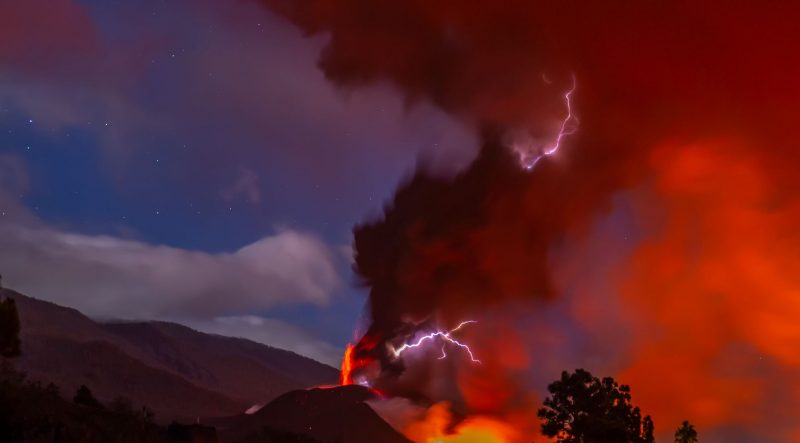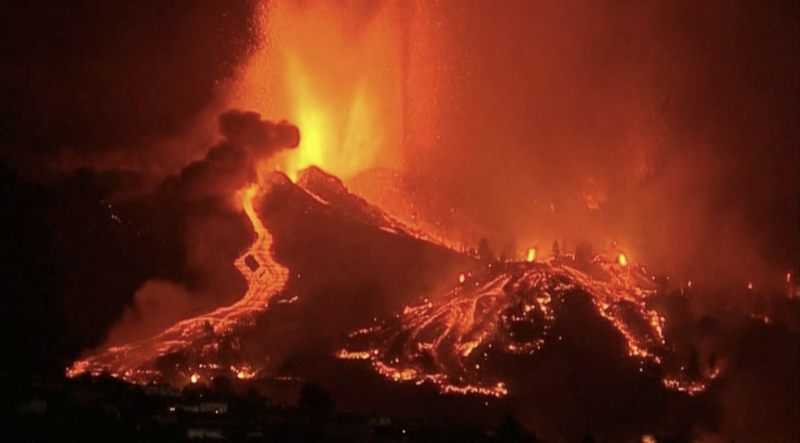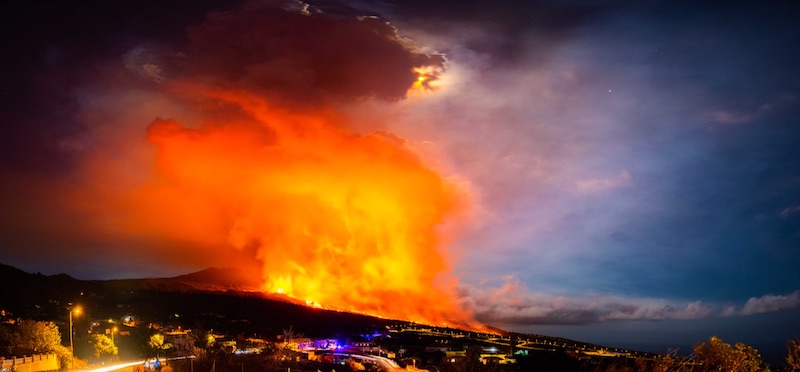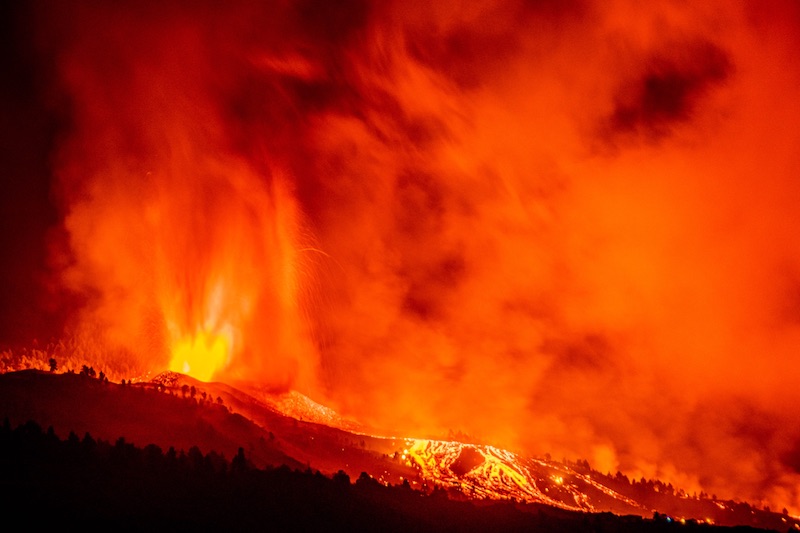
La Palma volcano began erupting on September 19
It’s been two months since a volcano on the Atlantic island of La Palma – part of Spain’s Canary Islands – began to erupt on September 19, 2021. And the volcano is still erupting. According to the Smithsonian’s Global Volcanism Program, as of November 16, the eruption at La Palma continues to be characterized by:
… Strombolian explosions and lava fountaining from multiple vents, advancing and sometimes branching lava flows, and daily ash emissions.
As of October, according to the Spanish news outlet 20minutos.es, the eruption has forced around 7,000 people to evacuate. And the lava flow has covered over 1000 hectares (about 4 square miles), making this volcano the most destructive in La Palma’s history. The lava flow is about 0.6 miles (1 km) wide and has reached the sea. 20minutos.es said the lava has destroyed more than 2,600 buildings, cut the coastal highway and formed a new peninsula.
The 2021 La Palma eruption is coming from Cumbre Vieja, considered to be one of the most active volcanos in the Canary Islands. Footage from local and international media shows the current eruption of red-hot lava and dust emanating from the Cumbre Vieja National Park in the south of the island. This volcano erupted twice in the 20th century, in 1949 and again in 1971. So, before the September 19 eruption began, the last eruption of this volcano on La Palma was 50 years ago. The 1971 eruption lasted just over three weeks.
See the images and video on this page. Our thanks to EarthSky Community members Roberto Porto and Antonio Gonzalez, both of whom are on La Palma, and who contributed photos to our community page.
The 2022 lunar calendars are here. Order yours before they’re gone!

Lava fills swimming pool, headed to sea
We want to thank those who, since yesterday, have been sending us messages about our situation. NOT staff and their families are well and safe. Here you have a cool pic of the #volcano taken from the top of Roque de los Muchachos by Emmy Paraskeva. #Lapalmaerupcion #ORMLaPalma pic.twitter.com/2mi3cjI8AX
— NOT Telescope (@nordictelescope) September 20, 2021



Bottom line: The La Palma volcano – which began on September 19, 2021 – has now been erupting for 2 months. Photos and video here.
The post La Palma volcano has been erupting for 2 months first appeared on EarthSky.
from EarthSky https://ift.tt/3nXGxTd

La Palma volcano began erupting on September 19
It’s been two months since a volcano on the Atlantic island of La Palma – part of Spain’s Canary Islands – began to erupt on September 19, 2021. And the volcano is still erupting. According to the Smithsonian’s Global Volcanism Program, as of November 16, the eruption at La Palma continues to be characterized by:
… Strombolian explosions and lava fountaining from multiple vents, advancing and sometimes branching lava flows, and daily ash emissions.
As of October, according to the Spanish news outlet 20minutos.es, the eruption has forced around 7,000 people to evacuate. And the lava flow has covered over 1000 hectares (about 4 square miles), making this volcano the most destructive in La Palma’s history. The lava flow is about 0.6 miles (1 km) wide and has reached the sea. 20minutos.es said the lava has destroyed more than 2,600 buildings, cut the coastal highway and formed a new peninsula.
The 2021 La Palma eruption is coming from Cumbre Vieja, considered to be one of the most active volcanos in the Canary Islands. Footage from local and international media shows the current eruption of red-hot lava and dust emanating from the Cumbre Vieja National Park in the south of the island. This volcano erupted twice in the 20th century, in 1949 and again in 1971. So, before the September 19 eruption began, the last eruption of this volcano on La Palma was 50 years ago. The 1971 eruption lasted just over three weeks.
See the images and video on this page. Our thanks to EarthSky Community members Roberto Porto and Antonio Gonzalez, both of whom are on La Palma, and who contributed photos to our community page.
The 2022 lunar calendars are here. Order yours before they’re gone!

Lava fills swimming pool, headed to sea
We want to thank those who, since yesterday, have been sending us messages about our situation. NOT staff and their families are well and safe. Here you have a cool pic of the #volcano taken from the top of Roque de los Muchachos by Emmy Paraskeva. #Lapalmaerupcion #ORMLaPalma pic.twitter.com/2mi3cjI8AX
— NOT Telescope (@nordictelescope) September 20, 2021



Bottom line: The La Palma volcano – which began on September 19, 2021 – has now been erupting for 2 months. Photos and video here.
The post La Palma volcano has been erupting for 2 months first appeared on EarthSky.
from EarthSky https://ift.tt/3nXGxTd

Aucun commentaire:
Enregistrer un commentaire